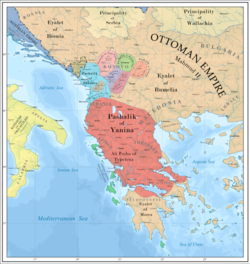
The Begolli family is an Albanian noble family, which rose to prominence in present-day Kosovo in the Ottoman era and were an influential feudal family in the region. [1] [2] [3]

The Begolli family is an Albanian noble family, which rose to prominence in present-day Kosovo in the Ottoman era and were an influential feudal family in the region. [1] [2] [3]
The Begolli were influential in Rrafshi i Dukagjinit area, Plav-Gusinje, and down to Shkodër. [4] They were landowners and held private armies.
Their first known member may have been Mere Hüseyin Pasha, Grand Vizier of the Ottoman Empire in the 16th century.
...familja e Beg-oglluve (Begolli),...
Më 6 gusht 1914 konsulli austriak Karl, nga Durrësi njoftonte Ministrinë e Punëve të Jashtme në Vjenë "mbi fillimin e aksioneve kundër pushtuesve serb"nga Hasan Prishtina, Selim Batusha, Bajram Daklani, Qazim Begolli e Halim Deralla (djali i Mehmet Derallës-Sh. B), të cilët kishin me vete"lëndë plasëse dhe municion për mauzerët".
7 shtator 1944 – 25 tetor 1944: Ibrahim Biçaku – Kryeministër dhe Ministër i Brendshëm, Ethem Cara – Ministër i Financave, Rrok Kolaj – Ministër i Arsimit, Lefter Kosova – Ministër i Punëve Botore, Rifat Begolli – Ministër i Ekonomisë, Akile Tasi – Ministër i Kulturës